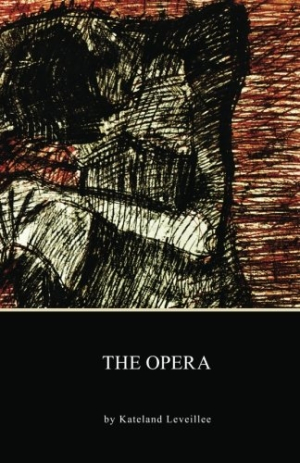
The Opera
In The Opera, Kateland Leveillee creates a vivid portrait of the tortured mind of a mad poet. It is a collection that is interesting in its premise but limited in its scope.
The speaker in Leveillee’s poems is at once deeply connected to the world through his senses—smelling a neighbor’s omelets, hearing the “crotchety motor” of the mailman’s “big, white box”—and utterly disconnected through his madness. The opera of the title seems to represent the many voices the speaker hears—some real, some possibly not—as well as the white noise of paranoia that reverberates in his mind. The book’s cover art nicely reflects the collection’s premise, and the editing and formatting, with the exception of a few typographical errors and the use of Roman numerals as page numbers, is appealing and professional.
The book includes an assortment of poems that offers readers a patchwork view of the speaker’s world. Descriptive poems like “Eggs” and “Afternoon” help set the physical scene of the speaker’s apartment. Narrative pieces share snippets of the speaker’s childhood and family, as in the poems “Court-Appointed Therapy on My Eighth Birthday” and “Introduction to Mother.” More experimental works, such as “The Retreat” and “They Flutter Out Like Tissues Now,” reflect the tension the speaker feels as he copes with insanity while yearning for expression through the written word.
There are lines that resonate not because of their brilliance but because they ache with human truth. In “Lunch,” Leveillee writes, “As I looked, the shadows began / to sway. I wonder if when / we leave a certain place, a piece / of us stays, wondering why / we left them.” The poem “Conclusion” offers a similar moment: “By the scent of my first grade classroom / I promise you this: A likeness unlike any other - / For that which we must never satisfy - Hunger / that isn’t hunger.” As well, the stark realities of mental illness—fearing those who are watching, confusing the past and the present, waking up in vomit—are strikingly portrayed.
Though the collection includes an interesting variety of poems, many employ traditional line breaks at the end of a phrase or complete thought, stunting the rhythm of the overall piece. Those that do play with line breaks and rhythm more liberally, especially “Why The Insane Never Dream/Always Scream” and “Back in the Apartment,” are energetic and engaging.
There are places where greater restraint would help Leveillee achieve finer impression. Though lines like “Oh wretched annihilator of sweet thought,” and “Together; For them; For CNN!” might work to remind readers of a person in an intense state of self-importance, they come across as overblown. The same can be said of instances of rhyme—“trying to wash away the shame / of our last name”—which, among lines that generally do not have a rhyme scheme, seem unnecessary.
Leveillee’s collection provides a dramatic look into a mad poet’s existence. Within the book’s pages, the opera resounds. But it is difficult to say what else the poems are doing other than reflecting the insanity of one man. The larger connection to or critique of today’s world of art and artistry, of what constitutes sanity, is difficult to find here because the poems, like the speaker, seem confined within the volume’s pages.
Reviewed by
Margaret Fedder
Disclosure: This article is not an endorsement, but a review. The publisher of this book provided free copies of the book and paid a small fee to have their book reviewed by a professional reviewer. Foreword Reviews and Clarion Reviews make no guarantee that the publisher will receive a positive review. Foreword Magazine, Inc. is disclosing this in accordance with the Federal Trade Commission’s 16 CFR, Part 255.
